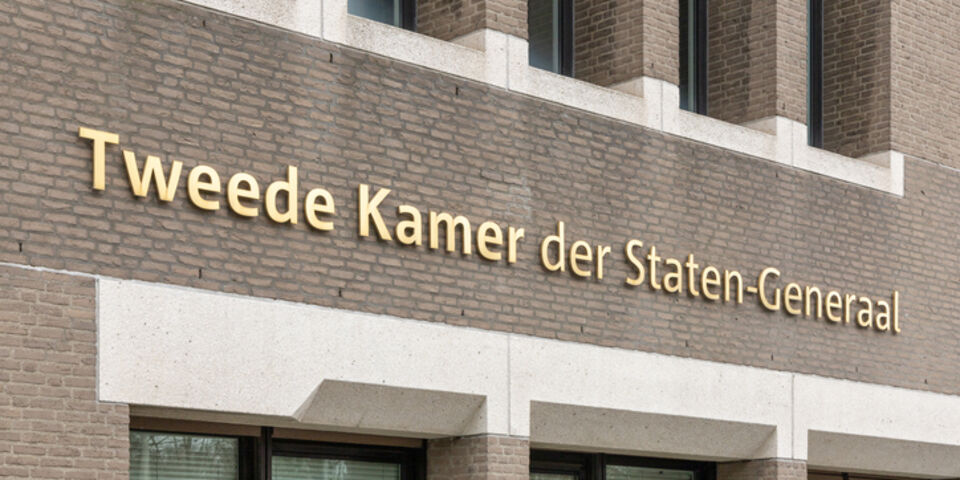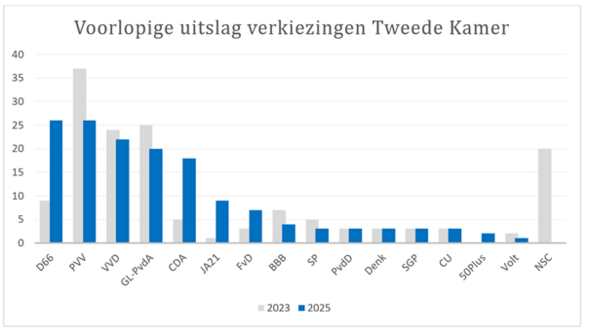What the election outcome means for students and science
D66 has gained 17 more seats in the House of Representatives compared to the previous elections and is claiming victory. According to the preliminary results, however, the party will have to share the top spot of 26 seats with the PVV, which lost 11 seats. What could this result mean for students, higher education, and science?
In the preliminary election results, D66 and the PVV are tied, both holding 26 seats. It seems almost inevitable that D66 will join the next government, while the PVV will end up in the opposition benches.
The damage for the VVD is limited—only two seats lost. The party would like to implement further budget cuts to education and research, but without the PVV in government, the chances of that happening are slim.
So what will happen next? Most likely, D66 will govern together with the CDA, as the Christian Democrats also performed well. The main question is which other parties will join them.
Through the center or to the right?
A broad centrist coalition with GroenLinks–PvdA and the VVD would secure a majority. Both parties may not be eager to do so, but they might still be willing to set aside their differences to form a coalition with D66 and the CDA.
Alternatively, JA21 and one smaller party could replace the VVD in such a centrist coalition with GroenLinks–PvdA. That outcome might be favorable for higher education and research, since JA21 has opposed budget cuts in education.
Could the coalition instead take a turn to the right? D66 could also govern with the CDA, VVD, and JA21. Together, they would hold 75 seats. One smaller party—such as ChristenUnie or BBB—could push them over the threshold. A right-leaning coalition would, however, make the government less progressive than Rob Jetten and his fellow party members might hope.
For students, universities of applied sciences, and universities, a government led by D66 could be good news regardless. While it remains to be seen what the coalition partners will agree on, some outcomes are already foreseeable.
More student finance…
D66 wants to increase the basic student grant by 164 euros per month, a measure that would cost roughly 600 million euros. GroenLinks–PvdA supports this proposal, but other potential coalition partners do not consider it necessary.
Compromise seems likely. The coalition might decide to raise only the supplementary grant or to increase the grant for students living on their own. It seems unlikely that student finance will remain untouched.
…and mandatory internship compensation
Three parties—D66, GroenLinks–PvdA, and the CDA—want to make internship compensation mandatory, so there’s a good chance that requirement will be introduced.
The VVD and JA21 are concerned that small business owners may stop offering internships if this happens. That issue could likely be resolved through a dedicated internship fund, which already has majority support in the House.
Extra funding for education and research…
D66 plans to allocate more than five billion euros in additional funding for education and research, separate from investments in innovation through Defense, healthcare, and the private sector. GroenLinks–PvdA proposes three billion, and JA21 has reserved about two billion.
The CDA is more cautious, as its platform does not include extra funding for education and research. Still, the Christian Democrats would probably accept that a D66-led cabinet spends more on these areas.
The VVD, for its part, still favors spending cuts—but this does not seem to be a top priority. After all, during the Rutte IV administration, the VVD was the largest governing party when the funding tap was opened.
…but what kind of research?
The exact allocation of research funding will likely be a subject of serious negotiation. Both the CDA and VVD want research to focus primarily on benefits for the labor market and society. JA21 shares that perspective.
D66 and GroenLinks–PvdA, while not opposed to applied research, also want to invest more in fundamental, curiosity-driven research in which scientists decide for themselves what they find worth exploring.
The most probable outcome? More funding for the applied research carried out at universities of applied sciences, and likely some extra funding for universities working on societal challenges. Fundamental science, however, may receive less attention.
Diversity…
The prospective coalition partners have widely differing views on diversity policies. Some believe higher education has become “too woke,” while others want to continue promoting equal opportunities. The most likely outcome of coalition talks: they’ll agree to disagree.
Their coalition agreement is unlikely to touch on topics such as diversity officers, gender-neutral restrooms, quiet rooms, or the dismissal of activist lecturers. These matters will probably be left to the discretion of educational administrators.Diversiteit…
…and demonstrations?
The same applies to the protests in higher education over ties between universities (and sometimes universities of applied sciences) and Israeli institutions. Some parties want stricter action against rioters, while others emphasize the right to protest.
Two options seem likely: the government may again leave such issues to university boards, or it could state something along the lines of “we will make agreements with universities and universities of applied sciences on safety and freedom of demonstration.” The details of such agreements would then be determined later.
In short…
The proposed budget cuts by PVV, VVD, NSC, and BBB are likely off the table. How quickly they disappear remains to be seen. The amount of additional funding that will be made available in the next governing period is also uncertain.
…or could the far right still take power?
There’s one other possible—though unlikely—scenario. If the CDA were to make a political U-turn and decide to govern with the PVV after all, things could look very different, leaving D66 out in the cold.
The PVV could even attempt to form a majority without the CDA, together with the VVD, JA21, Forum, BBB, SGP, 50Plus, and possibly one smaller party such as ChristenUnie or Partij voor de Dieren. But that seems a near-impossible task. For now, the PVV remains on the sidelines.
This article was translated using AI-assisted tools and reviewed by an editor



Discussion